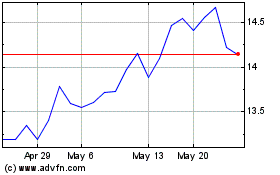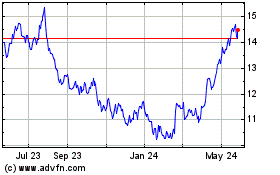Hong Kong's Hang Seng Index Gets a Facelift
March 01 2021 - 7:56AM
Dow Jones News
By Joanne Chiu
Hong Kong's flagship stock index is getting a major overhaul
that will expand the number of companies it covers and give more
sway to fast-growing technology stocks.
The changes to the Hang Seng Index, a key gauge of Hong Kong's
$6 trillion-plus stock market, amount to one of the biggest revamps
since it was launched in 1969. They also follow a period of
underperformance: despite a recent rally, the index has gained only
around 12% in the 12 months ended February, lagging U.S. benchmarks
and the Shanghai Composite.
On Monday, Hang Seng Indexes Co. said that it would eventually
broaden the index to up to 100 companies from the 55 that will be
in the index as of mid-March, and that it would ensure the
benchmark has a better mix of industries, reducing the outsize
impact of financial companies. The move follows a consultation
launched in December.
"Adding more stocks into the benchmark is always a good thing.
It's going to offer a much more diversified benchmark, which is
always important" to investors, said Ken Wong, a client portfolio
manager at Eastspring Investments.
However, Mr. Wong noted that the Hang Seng was less widely
tracked than indexes compiled by global peers like MSCI Inc. and
FTSE Russell.
In another change, some companies will be allowed to join the
index just three months after going public -- effectively
fast-tracking inclusion for newly listed startups, which currently
have to wait up to two years, depending on their size.
The index compiler will also cap any single stock at 8% of the
index, down from 10% now. At the same time, it will increase the
ceiling from 5% for companies with secondary listings in Hong Kong,
like Chinese tech giant Alibaba Group Holding Ltd., and those with
super-voting shares.
Gabriel Chan, head of investment services for Hong Kong at BNP
Paribas Wealth Management, said the overhaul was an overdue
improvement for investors, while the shorter waiting time would
make it more appealing for companies to list in Hong Kong.
The growing popularity of new-economy companies and those
catering to China's consumers has made the benchmark, which is
heavily influenced by the stocks of banks, insurers and real-estate
developers, less compelling to investors. Its biggest constituents
by weight are Tencent Holdings Ltd., insurer AIA Group Ltd. and
HSBC Holdings Plc.
The changes by the index compiler, a unit of HSBC Holdings
Ltd.'s Hang Seng Bank Ltd., echo moves by Hong Kong Exchanges and
Clearing Ltd., which in recent years has revamped its rules to
allow Chinese tech companies with supervoting shares and
unprofitable biotechnology companies to trade in Hong Kong.
Strategists at CCB International said adding more high-growth
tech stocks could boost the index's overall valuation. Cliff Zhao,
the bank's head of strategy, said the scope of the expansion had
exceeded his expectations.
Hang Seng Indexes Co. last year launched a separate 30-stock
tech index, creating a dedicated benchmark to reflect interest in
Hong Kong-listed Chinese tech stocks such as Alibaba and
Tencent.
The changes will start to take effect with an index rebalancing
in June. The Hang Seng will have 80 constituents by mid-2022 and
will ultimately expand to 100 stocks.
The compiler plans to keep no more than a quarter of Hong Kong
companies as constituents in its flagship index, which is dominated
by mainland Chinese businesses.
Write to Joanne Chiu at joanne.chiu@wsj.com
(END) Dow Jones Newswires
March 01, 2021 07:41 ET (12:41 GMT)
Copyright (c) 2021 Dow Jones & Company, Inc.
Hang Seng Bank (PK) (USOTC:HSNGY)
Historical Stock Chart
From Jan 2025 to Feb 2025

Hang Seng Bank (PK) (USOTC:HSNGY)
Historical Stock Chart
From Feb 2024 to Feb 2025
